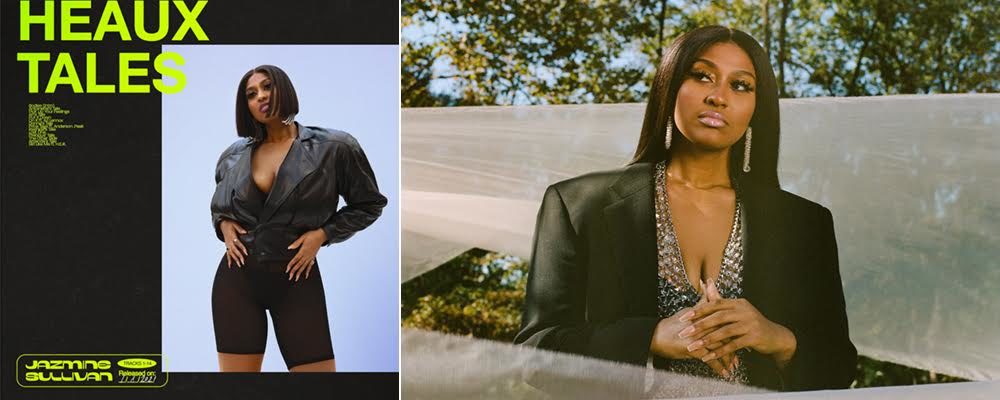Jazmine Sullivan Spotlights the Complexities of Being a Modern Woman on Unapologetic ‘Heaux Tales’
Todd Gilchrist
Jazmine Sullivan has been recording professionally for more than 12 years, a considerable accomplishment given that her breakthrough song, the revenge-themed hip-hop tango “Bust Your Windows,” blew up after an appearance on “Glee” in 2009. Sullivan’s aptitude for creating wild, confessional anthems has only evolved throughout her career, and her latest project, “Heaux Tales,” offers a true roller coaster ride for the listener as Sullivan wrestles with desire, empowerment, vulnerability, and grace over the course of an intro, seven tracks and six interludes, featuring a roster of guest stars who flesh out her self-reflection into some of the most candid and vital R&B being made right now.
Opening with “Bodies,” Sullivan vacillates between celebration of her own sexual freedom and self-indictment, establishing a tone that’s meant to be as inclusive as it is introspective. “Bitch, get it together, bitch,” she sings. “You don’t know who you went home with, who you went home with again… I keep on pilin’ up bodies on bodies on bodies / Yeah, you gettin’ sloppy, girl.” Containing multitudes is not just the cornerstone of Sullivan’s career, but of contemporary soul as a whole, but there’s something undeniably powerful when she’s examining herself (or even a fictional self) rather than directing those feelings outward as an act of pure girl power, or worse, moralizing. Inviting collaborators to speak on their own experiences, as she does with Antoinette Henry on “Antoinette’s Tale,” and later with Ari Lennox and others on the “Tales” that link her songs together, further generates a fascinatingly complex, often contradictory tapestry of perspectives that allows women — and more specifically, her listeners — to be themselves without reservation or judgment.
Henry talks about the power of women’s sexuality, and the fragility of men’s egos. Lennox admits to the career-threatening sexual thrall she was caught in with a former lover. Rashida Northington discusses how she internalized betrayals that she experienced and then performed on a woman that she loved. These vignettes, or confessions, are meant to be taken together, cumulatively, as an expression of the many faces women have — to the world, to their partners and friends, their lovers, their communities, to themselves. Sullivan subsequently distills some of these ambiguities into her songs, shuffling from a kiss-off like “Pick Up Your Feelings” to the almost sheepish “Put It Down,” where she admits her inexorable attraction to a no-good man, to the playful but come-ons of “On It,” where she and Lennox trade verses telling the man that they like that he needs to step up his game. There’s something truly refreshing about the way that Sullivan curates points of view here that acknowledge their own shortcomings and inconsistencies, and allows them to be messy, and sometimes even wrong.
Deciding which choices might need re-evaluation is left to the listener while Sullivan delivers more than a few sneak-attack bangers, such as “Pricetag,” where she and Anderson .Paak offer the perspective of a young woman who admits “I’ma take all I can get / That money keeps the pussy wet” as her lover grows increasingly skeptical of what’s keeping her in their relationship. Then there’s “Lost One,” a ballad where she surveys the aftermath of a relationship by asking him not to fill her absence with the same kind of fun she’s been seeking to mask her pain — or worse, find something new and meaningful. But as she wraps the Extended Play with “Girl Like Me,” where she and H.E.R. wonder why they weren’t enough for a former partner, and consider all of the superficial augmentations to undertake to become more desirable or appealing, Sullivan ultimately captures the energy of not just a single woman or all women but an entire generation that’s been captivated, even shackled by the culture of envy and aspiration created by social media’s false portraits of intimacy and success.
“Knew it was real when you blocked me / Now I sit at home judgin’ my body / Wondering what I did to lose you / Why in the hell you ain’t choose me?,” Sullivan asks. Like so many real people, this character longs for an approval, a validation that comes from endless comparisons to others, forming a blockade from happiness rather than facilitating it. And certainly that’s not fun or frivolous as so much r&b is trying to be right now, but its honesty is bracing and essential. “Heaux Tales” may or may not be a full-on classic from a musical standpoint, but as a referendum on womanhood, on life lived through the prism of social media, and on contemporary culture, it makes an important and profound statement that is worth hearing even when it’s not fun to listen to.
“Heaux Tales” releases Jan. 8 on Apple Music.

